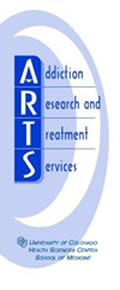Dr. Christian Hopfer conducts research primarily on familial and genetic influences on adolescent substance use disorders. He is currently funded by the National Institute on Drug Abuse of the NIH to study the familial transmission of substance use disorders and is also involved in a large national study examining 17,000 adolescents who have been followed and are now adults. He is also an expert on the treatment of heroin dependence. His clinical work involves treating patients with substance dependence problems as the psychiatric director at the Addiction Research and Treatment Services, a large substance abuse treatment program affiliated with the University of Colorado that serves over 1000 patients per day (link below). |

|
–FROM CELLS TO SOCIETY: THE SCIENCE OF DRUG ABUSE –
The talk will largely focus on an overview of the scientific view of drug and alcohol abuse. Drug and alcohol abuse has historically been, and in many cases still is, seen as a failure of morals. The scientific approach to the problem, however, has revealed a more complex picture. First, of the quadrillions of chemical compounds that exist, only a very small number are voluntarily self-administered, to the point sometimes of continued self-administration even in the face of adverse consequences. Substantial research into these few classes of compounds have demonstrated that they all act on specific brain sites and effectively mimic naturally occurring compounds that are involved in the brain’s “reward system” which focuses attention on salient environmental stimuli and are important for survival. Thus, nicotine acts on the nicotinic receptor, cannabis on the cannabinoid receptor, alcohol on the GABA-complex, opiates on the opiate-receptor and so forth.
We can review the scientific understanding of what “Substance Dependence” or addiction involves, including physiological symptoms such as tolerance and withdrawal, psychological symptoms such as craving, which can result in the majority of the person’s energy being devoted to obtaining or using the substance, while he or she neglects other responsibilities.
Finally, we can briefly discuss issues in drug control policy; all substances which have abuse potential are regulated to some extent, and there are pros and cons to different regulation policies. There are substances that are allowed for legal consumption, but which policies limit these in various ways (alcohol, tobacco); substances which are legal when obtained via prescription and illegal when obtained otherwise, such as opiates, benzodiazapenes and cocaine; and currently illegal substances such as methamphetamines and designer drugs. The ongoing controversy about marijuana will be addressed as an illustrative point of whether an illegal substance which in small quantities is already more quasi-illegal than illegal should be quasi-legalized. Pros and cons will be discussed.
We won't get to all these topics in a single Cafe but these are the areas we'll be thinking about.
Recommended resources (click on logo)
|


